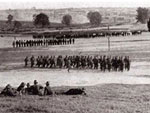*Please note that this video is no longer hosted by the Teachers TV website. It may be hosted on a different site and found through doing an internet search on the video's title.
Interpretation in Action examines a mixed-ability 9th-grade class working with documentary films. This video shows students working to plan, write, and organize their own documentaries about World War I. In this video, students create an account of the Battle of the Somme and, in so doing, practice evaluating historical evidence and constructing interpretations. This video provides examples of two promising practices:
- Engaging students in creating their own historical interpretations through the scripting of their own documentary films; and
- Structuring instruction so students move back and forth between historical evidence and their interpretations of what that evidence means.
World War I and the Battle of the Somme
Before beginning work on their films, students spent a week developing deeper understandings of World War I, particularly the Battle of the Somme, the subject of the documentary film that students viewed in the first part of this two-part video. Students then spend time collecting accounts of the battle that they will use for their projects.
Constructing a Historical Interpretation
According to the instructor of this class, creating their own documentaries helps students understand that history is a result of evidence-based interpretation. The task turns the process of doing history inside-out, asking students to construct narratives rather than simply learning them. It also makes transparent the dual purposes of documentary historical film: providing a credible record of the past and entertaining a target audience.
Using Historical Evidence
In this assignment, students create historical interpretations as if they were planning a documentary film. To do so, they are told, requires careful use of evidence. Consequently, the students' first task is to examine primary sources regarding World War I and the Battle of the Somme. After asking questions about the reliability of sources and comparing them against each other, students begin to piece together narratives. Then, having constructed initial interpretations, students are asked to return to the evidence to carefully select images and words, which they then sequence in a documentary-style narrative. By having students move back and forth between evidence and interpretation, the instructor helps them understand a complicated process.
Exemplary Practices
Many teachers use documentary film in the classroom, but few use it to teach about historical interpretation. This lesson takes this concept a step further by having students plan their own documentary films. Consequently, the lesson directly engages students in the work that historians do and helps them develop skills that they will continue to use throughout their history coursework.
